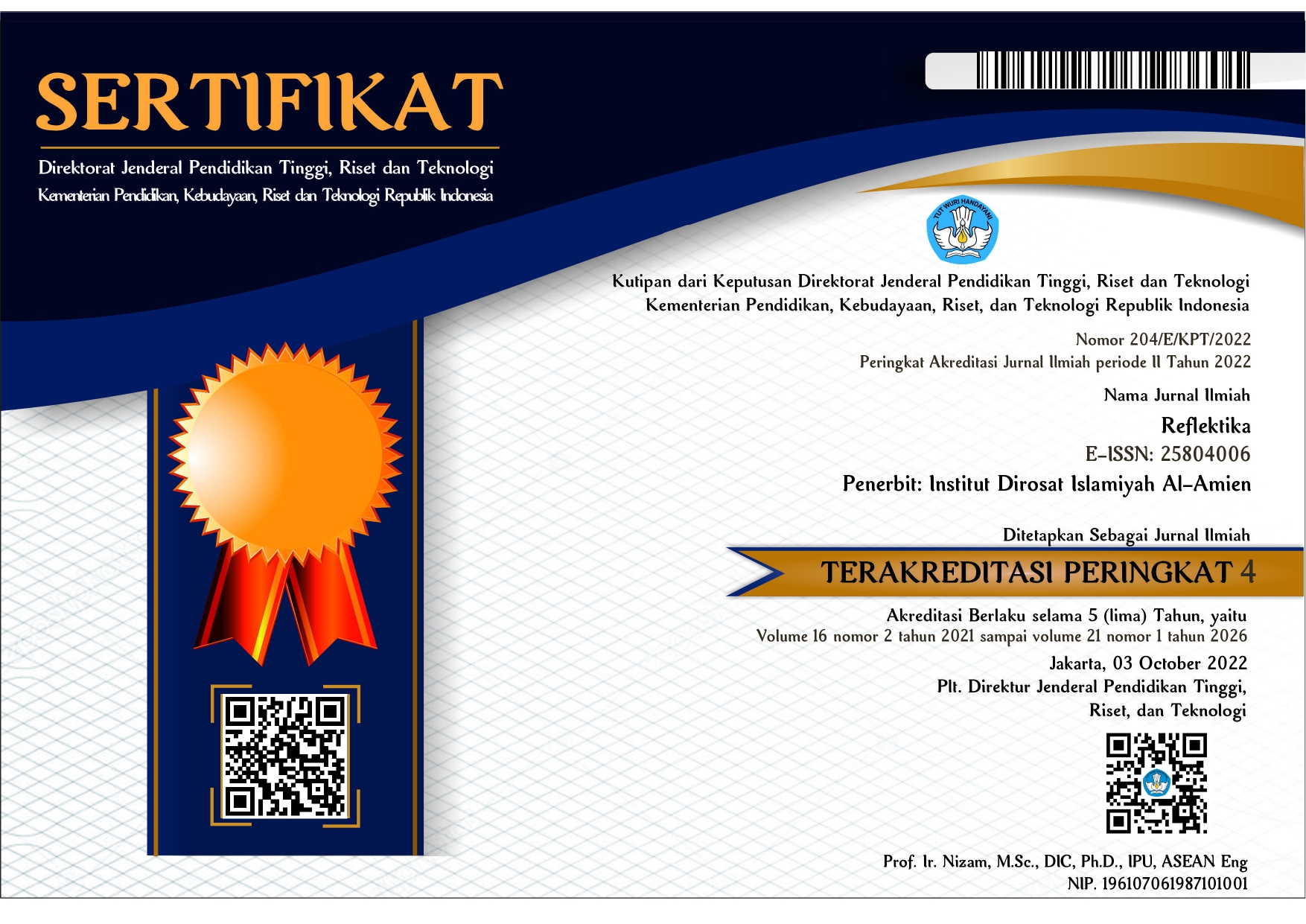IMPLEMENTASI COOPERATIVE LEARNING DALAM MENINGKATKAN MOTIVASI BELAJAR SISWA PENDIDIKAN TINGKAT DASAR
Abstract
Abstract
This study aims to explore the application and impact of cooperative learning in increasing students' learning motivation at Madrasah Ibtidaiyah Sabilul Muttaqien Buddagan Pamekasan. This research uses a qualitative approach with a field research method, where data is collected through observation, in-depth interviews, and documentation. The results show that the application of Cooperative Learning in this madrasah involves several approaches that are tailored to the students' conditions, including Jigsaw and Think-Pair-Share. The implementation of cooperative learning has a positive impact on students' intrinsic motivation and extrinsic motivation. Students become more actively involved in the learning process, experience increased self-confidence, and show better cooperation skills with their classmates. In addition, the findings also indicated implementation challenges, such as different levels of student engagement, time management, and diverse academic abilities within the groups. However, through adjustments in learning strategies, such as clearer role setting and intensive guidance from teachers, these obstacles can be overcome.
Keywords
References
Abramczyk, Anna, and Susanne Jurkowski. “Cooperative Learning as an Evidence-Based Teaching Strategy: What Teachers Know, Believe, and How They Use It.” Journal of Education for Teaching 46, no. 3 (2020). https://doi.org/10.1080/02607476.2020.1733402.
Bandura, Albert. “Social Cognitive Theory: An Agentic Perspective.” Asian Journal of Social Psychology 2, no. 1 (1999): 21–41. https://doi.org/10.1111/1467-839x.00024.
Busetto, Loraine, Wolfgang Wick, and Christoph Gumbinger. “How to Use and Assess Qualitative Research Methods.” Neurological Research and Practice, 2020. https://doi.org/10.1186/s42466-020-00059-z.
Chowdhury, Takad Ahmed. “Fostering Learner Autonomy through Cooperative and Collaborative Learning.” Shanlax International Journal of Education 10, no. 1 (2021). https://doi.org/10.34293/education.v10i1.4347.
Galindo-Domínguez, Héctor, Haizea Galarraga Arrizabalaga, Martín Sainz de la Maza, and Daniel Losada Iglesias. “Main Problems in Team Work and Solving Methods: Cooperative Learning as a Challenge in the Training of Future Teachers.” Revista Complutense de Educacion 35, no. 1 (2024). https://doi.org/10.5209/rced.82542.
Gardner, H. “Howard Gardner’s Theory of Multiple Intelligences Human.” Flinders School of Ed, 1995.
Gillies, Robyn M. “Cooperative Learning: Review of Research and Practice.” Australian Journal of Teacher Education, 2016. https://doi.org/10.14221/ajte.2016v41n3.3.
Gull, Fariha, and Shumaila Shehzad. “Effects of Cooperative Learning on Students’ Academic Achievement.” Journal of Education and Learning (EduLearn) 9, no. 3 (2015). https://doi.org/10.11591/edulearn.v9i3.2071.
How, Heng Ee, Chong Chew Lan, Siti Noorahayusolah Binti Binti Kosnandi, and Nur Syuhada Binti Binti Zainal Abidin. “Factors of Increasing Students’ Motivation in Educational Settings: A Review.” International Journal of Academic Research in Business and Social Sciences 14, no. 1 (2024). https://doi.org/10.6007/ijarbss/v14-i1/20412.
Jainal, Norafiah Haji, and Masitah Shahrill. “Incorporating Jigsaw Strategy to Support Students’ Learning through Action Research.” International Journal on Social and Education Sciences 3, no. 2 (2021). https://doi.org/10.46328/ijonses.75.
Johnson, David W., and Roger T. Johnson. “Social Interdependence Theory and Cooperative Learning: The Teacher’s Role.” In The Teacher’s Role in Implementing Cooperative Learning in the Classroom, 2008. https://doi.org/10.1007/978-0-387-70892-8_1.
Johnson, David W., Roger T. Johnson, and Karl A. Smith. “Cooperative Learning Returns to College: What Evidence Is There That It Works?” In Learning from Change: Landmarks in Teaching and Leaming in Higher Education from Change Magazine, 1969-1999, 2023. https://doi.org/10.1080/00091389809602629.
Lasmawan, I Wayan, and I Wayan Budiarta. “Vygotsky’s Zone Of Proximal Development and The Students’ Progress in Learning (A Heutagogcal Bibliographical Review).” JPI (Jurnal Pendidikan Indonesia) 9, no. 4 (2020). https://doi.org/10.23887/jpi-undiksha.v9i4.29915.
Mundelsee, Lukas, and Susanne Jurkowski. “Think and Pair before Share: Effects of Collaboration on Students’ in-Class Participation.” Learning and Individual Differences 88 (2021). https://doi.org/10.1016/j.lindif.2021.102015.
Murdoch, Kath, and Jeni Wilson. “What Is Cooperative Learning?” In Helping Your Pupils to Work Cooperatively, 2020. https://doi.org/10.4324/9780203824634-5.
Rofiqi, and Roro Kurnia Nofita Rahmawati. “Dinamika Kelompok Dalam Cooperative Learning Model ( Analisis Psikologi Sosial Terhadap Interaksi Siswa Dalam Pembelajaran Pendidikan Agama Islam ).” Al-Riwayah 15, no. 2 (2023): 290–304. https://doi.org/https://doi.org/10.47945/al-riwayah.v15i2.1121.
Rofiqi, Rofiqi, and Roro Kurnia Nofita Rahmawati. “Dinamika Kelompok Dalam Cooperative Learning Model: Analisis Psikologi Sosial Terhadap Interaksi Siswa Dalam Pembelajaran Pendidikan Agama Islam.” Al-Riwayah: Jurnal Kependidikan 15, no. 2 (2023): 290–304.
Rofiqi, and Hendi Sugianto. “Analisis Pola Komunikasi Interpersonal Guru-Siswa Dalam Interaksi Pembelajaran Pendidikan Agama Islam.” Cognitive: Jurnal Pendidikan Dan Pembelajaran 2, no. 1 (2024): 68–82.
Ryan, Richard M., and Edward L. Deci. “Self-Determination Theory and the Facilitation of Intrinsic Motivation, Social Development, and Well-Being.” American Psychologist 55, no. 1 (2000). https://doi.org/10.1037/0003-066X.55.1.68.
S. Kaymak, Zh.Kassymbek, A. Kalamkas, and F. Saydenov. “The Effect of Cooperative Learning on Students Academic Achievement.” Management Studies 9, no. 6 (2021). https://doi.org/10.17265/2328-2185/2021.06.009.
Sharan, Yael, and Shlomo Sharan. “Group Investigation Expands Cooperative Learning.” Educational Leadership 47, no. 4 (1990).
Shaw, Dave, Trish Gorely, and Rod Corban. “C6. Goal-Setting Theory.” In BIOS Instant Notes in Sport and Exercise Psychology, 134–37. Routledge, 2020. https://doi.org/10.4324/9780203325568-27.
Sibomana, Aimable, Claude Karegeya, and John Sentongo. “Effect of Cooperative Learning on Chemistry Students’ Achievement in Rwandan Day-Upper Secondary Schools.” European Journal of Educational Research 10, no. 4 (2021). https://doi.org/10.12973/EU-JER.10.4.2079.
Slavin, Robert E. “When Does Cooperative Learning Increase Student Achievement?” Psychological Bulletin 94, no. 3 (1983). https://doi.org/10.1037/0033-2909.94.3.429.
Strom, Paris S., and Robert D. Strom. “Overcoming Limitations of Cooperative Learning among Community College Students.” Community College Journal of Research and Practice 26, no. 4 (2002). https://doi.org/10.1080/106689202753546466.
Tran, Van Dat. “Does Cooperative Learning Increase Students’ Motivation in Learning?” International Journal of Higher Education 8, no. 5 (2019). https://doi.org/10.5430/ijhe.v8n5p12.
Turner, David T., Edel McGlanaghy, Pim Cuijpers, Mark Van Der Gaag, Eirini Karyotaki, and Angus MacBeth. “A Meta-Analysis of Social Skills Training and Related Interventions for Psychosis.” Schizophrenia Bulletin 44, no. 3 (2018). https://doi.org/10.1093/schbul/sbx146.
Uyun, Muhamad, Yuli Bahriah, and Fitriani Fitriani. “Interest and Learning Motivation with Student Participation.” Psikoislamedia : Jurnal Psikologi 7, no. 2 (2022). https://doi.org/10.22373/psikoislamedia.v7i2.13794.
W. Johnson, David, and Roger T. Johnson. “Cooperative Learning: The Foundation for Active Learning.” In Active Learning - Beyond the Future, 2019. https://doi.org/10.5772/intechopen.81086.
Wigfield, Allan, and Jacquelynne S. Eccles. “Expectancy-Value Theory of Achievement Motivation.” Contemporary Educational Psychology 25, no. 1 (2000). https://doi.org/10.1006/ceps.1999.1015.
Williams, Robert L., Erin Carroll, and Briana Hautau. “Individual Accountability in Cooperative Learning Groups at the College Level: Differential Effects on High, Average, and Low Exam Performers.” Journal of Behavioral Education, 2005. https://doi.org/10.1007/s10864-005-6296-3.
DOI: 10.28944/reflektika.v19i1.1868
Refbacks
- There are currently no refbacks.


.png)

